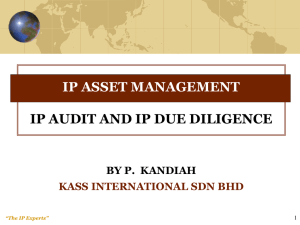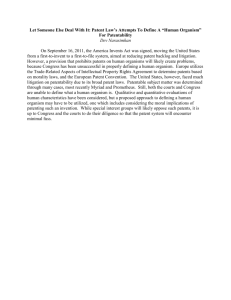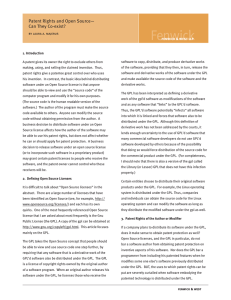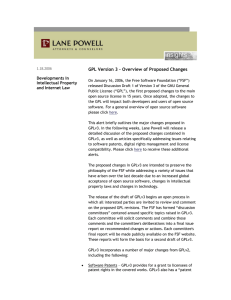Open Source Software – Licences and Business Models
advertisement
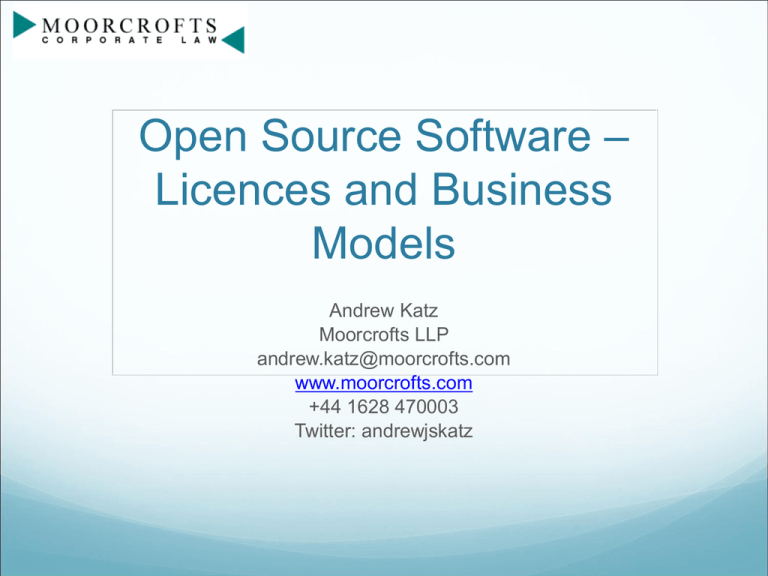
Open Source Software – Licences and Business Models Andrew Katz Moorcrofts LLP andrew.katz@moorcrofts.com www.moorcrofts.com +44 1628 470003 Twitter: andrewjskatz Background Andrew Katz – Partner, Moorcrofts LLP Thames Valley, UK IP Law – Software licensing, compliance Corporate Law – due diligence on corporate transactions (M&A, VC investments) Employment law – IP transfer for employees Commercial Property – as software companies develop... Open Source - Introduction What is open source? Freedom to tinker, freedom to distribute, freedom to share. Also called “free software” Free as in freedom – but also free as in no licence fees. How does it work? Source code used to create object code Recipe used to create a cake Cake = the software you run on the computer With proprietary software, you only get the cake. You can't tinker with the recipe. Free/open source software lets you have the recipe, and make your own cake. In practice very few people actually tinker with the recipe – but they can, and others can take advantage of that tinkering. Licensing Author chooses to license under a licence granting open source freedoms Some very easy to comply with “You can do anything you like with this software, as long as you buy me a beer sometime if we meet” Some more difficult to comply with GNU GPL says that you can only use GPL code if modified/distributed code is also released under the GPL “copyleft” Licensing There are hundreds of different licences. But the 6 most common licences cover about 90% of open source projects About 55% use a copyleft licence Open source in the Real World Google – runs on open source and sponsors open source projects Amazon – runs on open source infrastructure – developed an open source cloud strategy (EC2) Apache – by far the most popular web server Firefox – world's most popular browser Android, Symbian – open source phone operating systems Linux – >78% of the world's top 500 supercomputers How does it make money? 80% of a typical IT project spend: Project consultancy/management Implementation Custom coding Integration Data migration Training and implementation Maintenance and support Only 20% typically licence fees Collaborative R&D Avoids reinventing the wheel Who makes money out of it? Oracle/Sun - $7bn acquisition of Sun IDC – projected $8bn open source revenues worldwide in 2013 – 22.4% compound annual growth rate Red Hat – over $500mn revenue in 2008/9 Google – mkt cap $169bn etc... “Linux is a cancer that attaches itself in an intellectual property sense to everything it touches” Steve Ballmer, Microsoft, May 2001 “Linux potentially violates 238 patents” Steve Ballmer, Microsoft, November 2004 ? We counted over a million lines of code that we allege are infringed in the Linux kernel today. Darl McBride September 11, 2003 Oracle vs. Google Claimed patent infringement and copyright infringement in Android mobile phone operating system What are the real risks? Copyright infringement Patent infringement Copyright infringement Two types of copyright user: End-users Software companies/developers Two types of infringement Inclusion of proprietary code in OS Breach of strict terms of OS licence End users Unlikely to suffer a claim anyway – will copyright owners sue potential customers, or the infringing distributors? SCO only example case. Coders want to replace infringing code! If breach is of open source code, end users will NOT get sued Even if the distributor is in breach, end user is protected under GPL Open source programmers want their software to be used How can damages be quantified? Software Companies Can ALWAYS remedy a breach of the GPL with payment of zero pounds But compliance will require them to release source code of derived code, and make it available for no licence fee. Patent Risk More difficult to quantify, but no reason should be any different for an open source company than a proprietary company. Big proprietary suppliers see patents as a lever to scare people away from open source. In the UK and Europe, relatively fewer software patents than the US, therefore less risk – eg Microsoft has 945 patents potentially affecting the UK, 14,195 registered in the US. Patent Risk Even so, patents are a potential risk Many open source companies have, or have access to, patent portfolios: IBM Open Invention Network Patent Commons Project the GPL, under which Linux is distributed, violates the United States Constitution Darl McBride, CEO SCO, Open Letter, December 2003 Linus Torvalds (originator of the Linux kernel): "If Darl McBride was in charge, he'd probably make marriage unconstitutional too, since clearly it de-emphasizes the commercial nature of normal human interaction, and probably is a major impediment to the commercial growth of prostitution." Open Source Software Andrew Katz Moorcrofts LLP www.moorcrofts.com andrew.katz@moorcrofts.com +44 1628 470003 Twitter: andrewjskatz
